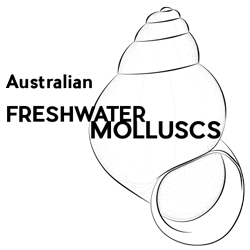
This species has rounded whorls (rarely dorsally subangled), and is sculptured with weak growth lines only. It reaches 2.9 mm in maximum diameter, but is usually around 2 mm.
Glacidorbis hedleyi Iredale, 1943
Class Gastropoda
Infraclass Heterobranchia
Infrasubcohort Panpulmonata
Superorder Pyropulmonata
Order Amphibolida
Suborder Glacidorbina
Superfamily Glacidorboidea
Family Glacidorbidae
Genus Glacidorbis Iredale, 1943
Original name: Glacidorbis hedleyi Iredale, 1943. In Iredale, T. (1943). A basic list of the freshwater Mollusca of Australia. Australian Zoologist 10: 188-230.
Type locality: Blue Lake, 35 feet, Mt Kosciusko, New South Wales.
In small streams (perennial and intermittent), springs and swamps in highlands, amongst moss, roots of water plants and similar substrates. Locally common. Feeds on small injured animals, such as insect larvae and other molluscs (Ponder, 1986). Broods embryos in mantle cavity (direct development).
Mid-New South Wales (including Mt Kaputar) to mid-western Victoria.
Has most extensive range of all Glacidorbis species.
Boulton, A. a. S., B.J. (1985). A range extension of the snail Glacidorbis hedleyi Iredale 1943 in Victoria. Victorian Naturalist 103: 123- 126.
Ponder, W. F. (1986). Glacidorbidae (Glacidorbacea: Basommatophora), a new family and superfamily of operculate freshwater gastropods. Zoological Journal of the Linnean Society 87: 53-83.
Ponder, W. (2019). Glacidorbidae Ponder, 1986. Pp. 143-144 in C. Lydeard & Cummings, K. S. Freshwater Mollusks of the World: a Distribution Atlas. Baltimore, John Hopkins University Press.
Ponder, W. F., Clark, S. A. & Dallwitz, M. J. (2000). Freshwater and estuarine molluscs: an interactive, illustrated key for New South Wales. Melbourne, CSIRO Publishing.
Ponder, W. F. & Avern, G. J. (2000). The Glacidorbidae (Mollusca: Gastropoda: Heterobranchia) of Australia. Records of the Australian Museum 52: 307-353.
Smith, B. J. & Kershaw, R. C. (1979). Field guide to the non-marine Molluscs of South-eastern Australia. Canberra, A.N.U. Press.